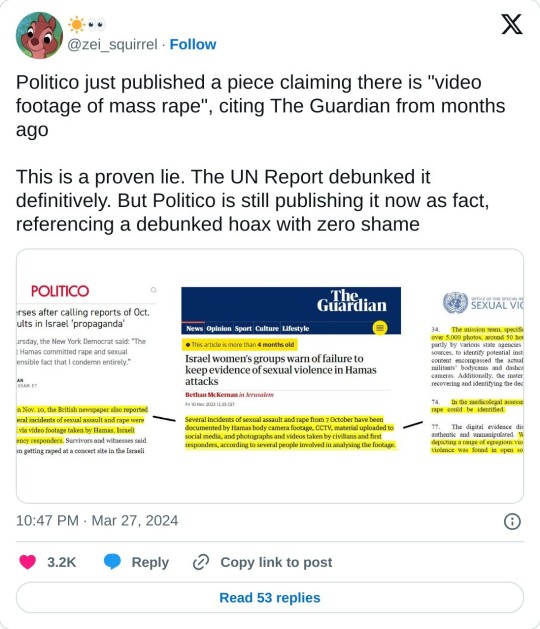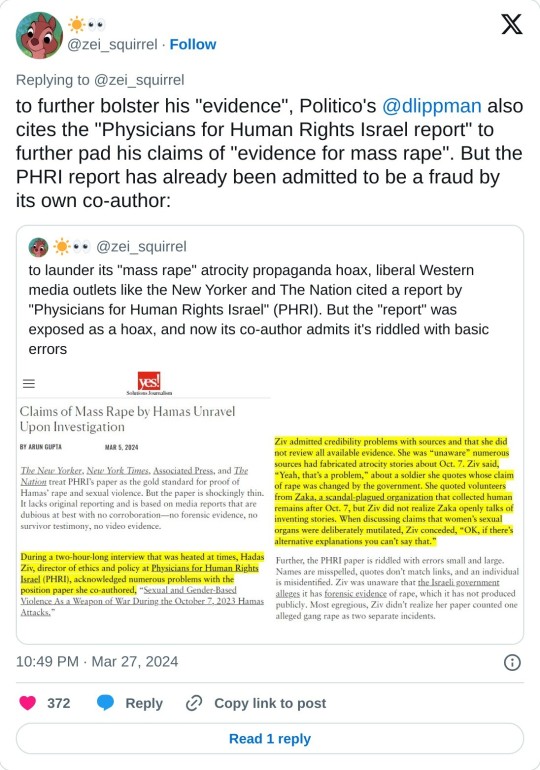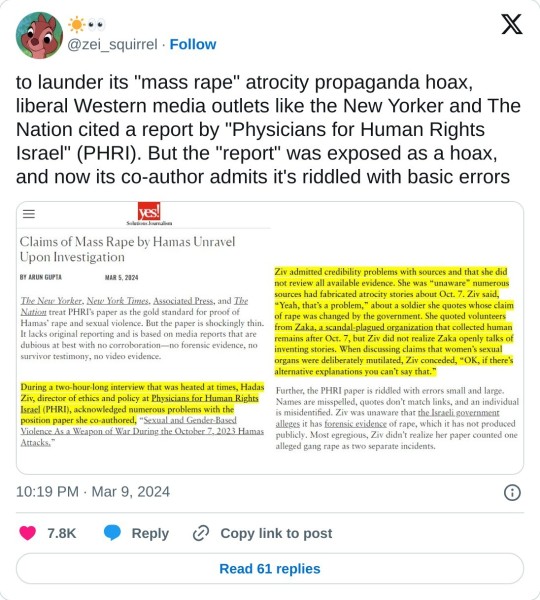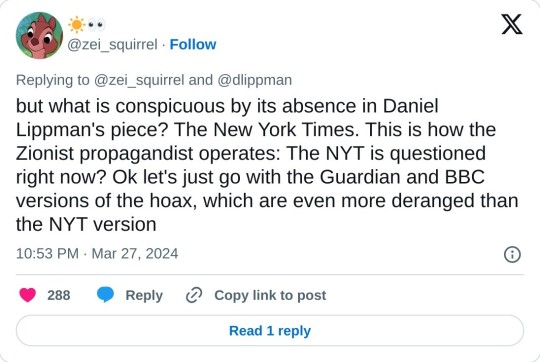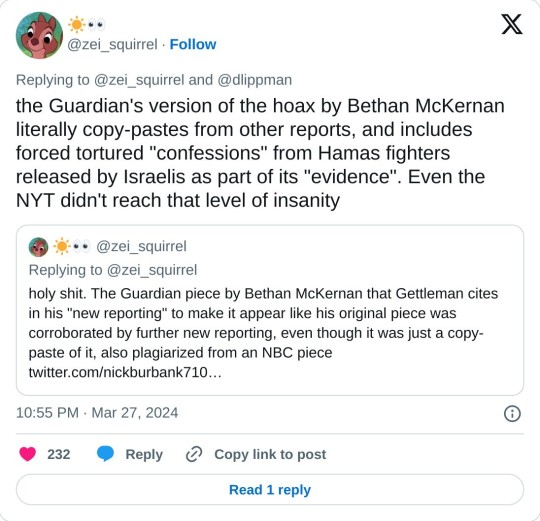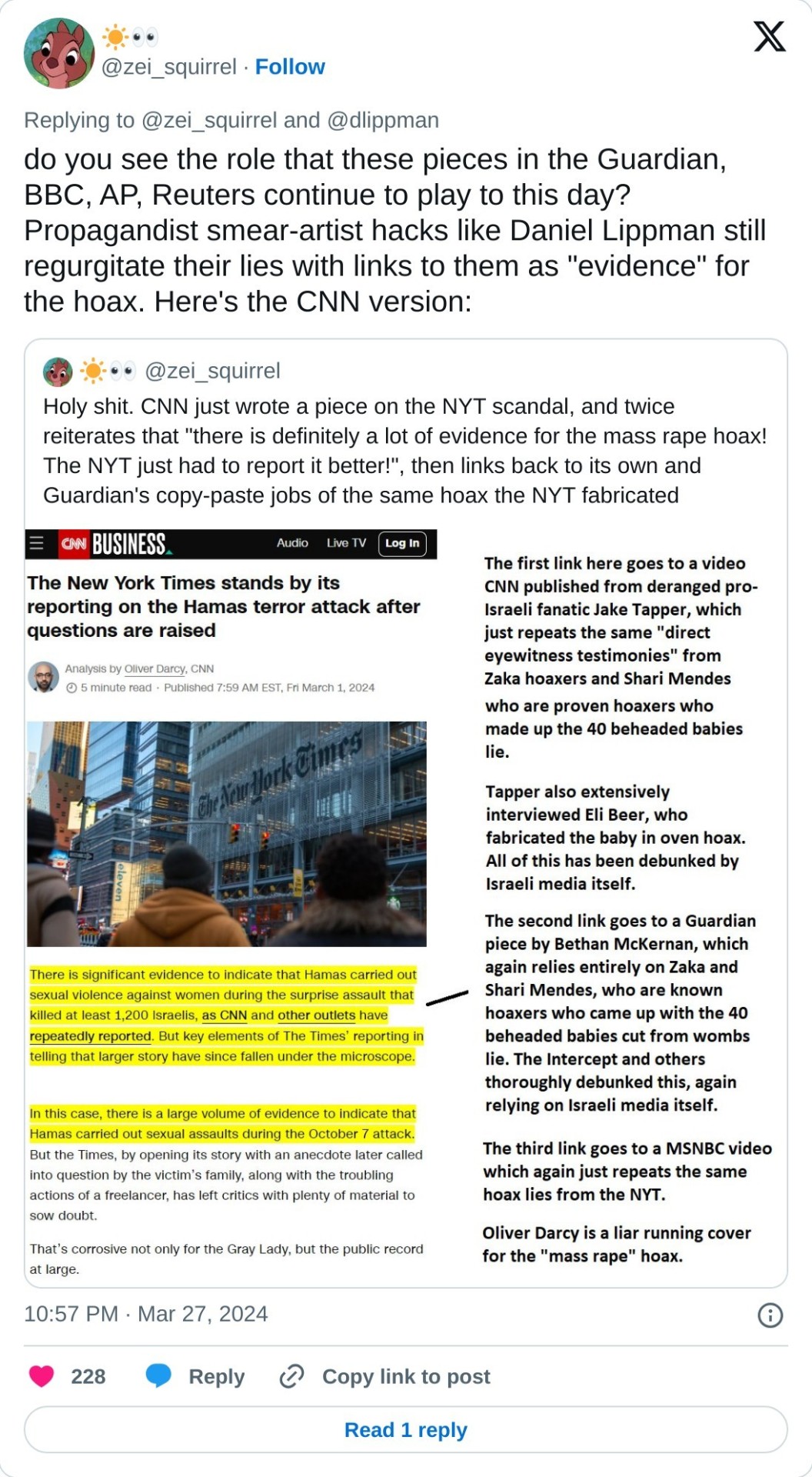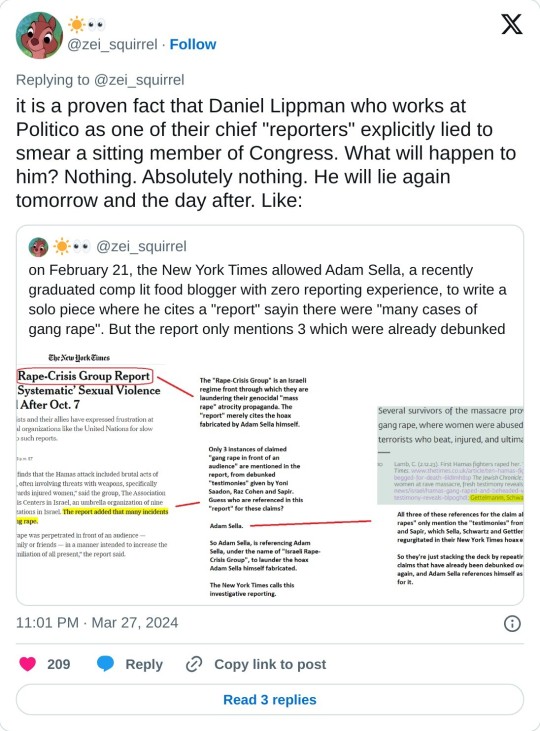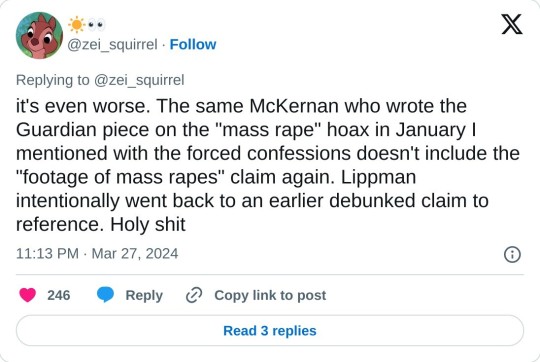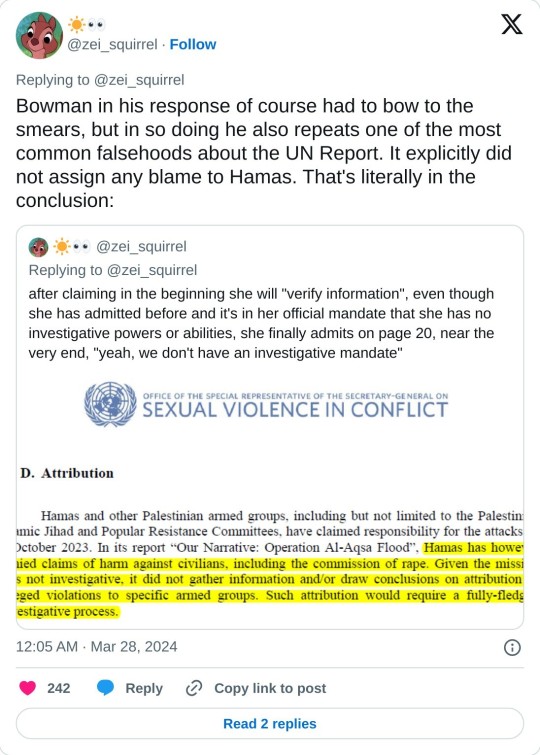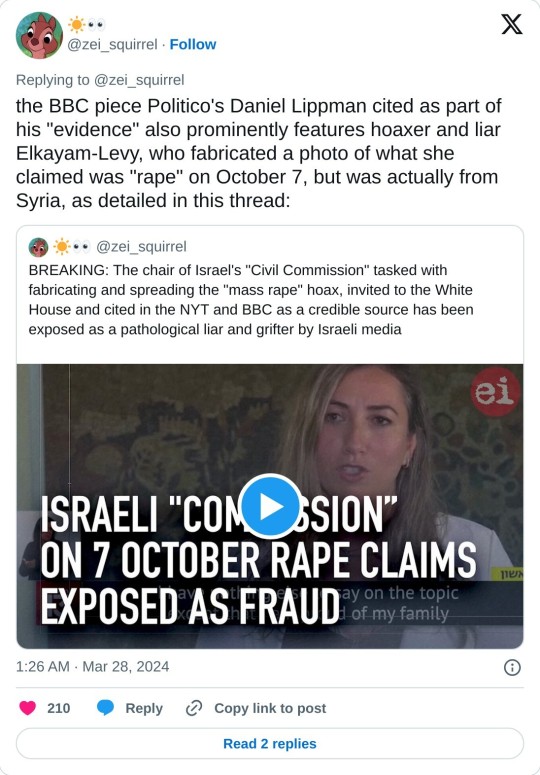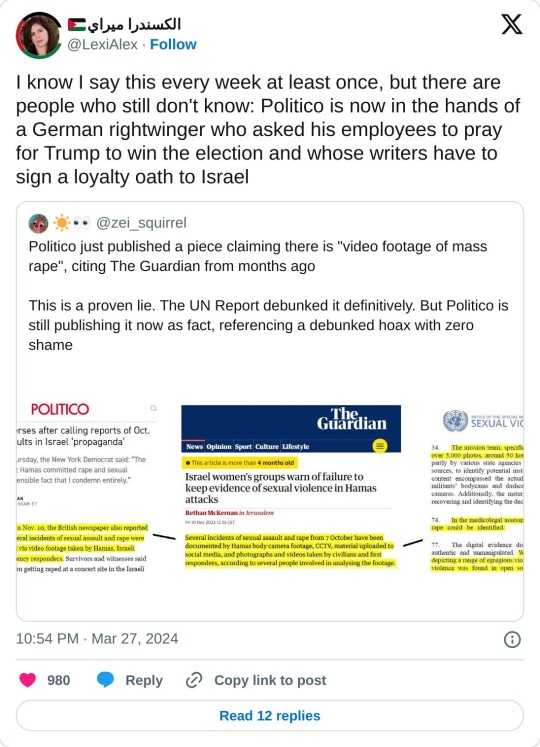#politico
Text

Politico defending LITERAL WWII Nazis.
Politico seriously suggests there is "nuance" around Yaroslav Hunka's joining of the Nazi 14th Waffen SS Grenadier Division (1st Galicia) to fight the Soviet Union and, like Canadian commentators over the last few days, suggests no war crimes were committed by this Division.
That's COMPLETE AND UTTER LUNACY.
The Nazi Germany 14th Waffen Grenadier Division of the SS was NOTORIOUS for SLAUGHTERING their way through Ukraine, enthusiastically participating in the genocide of Poles, Roma, Jews, and Socialists/Communists
These people are manipulating history and your ignorance of it to make Nazis go from black and white obvious evil, to shades of grey in which you're not "expert" enough to have an opinion on, thereby weakening efforts to expose fascist ideology being integrated into Western society.
#nazis#yuroslav hunka#nazis in canada#nazis in ukraine#western propaganda#us propaganda#war propaganda#propaganda#news#politico#politics#world news#international news#geopolitics#geopolitical news#geopolitics news#geopolitical events#international affairs#international politics#socialism#communism#marxism leninism#socialist politics#socialist news#socialist#marxism#communist#workersolidarity#worker solidarity#WorkerSolidarityNews
207 notes
·
View notes
Text

This headline writer was certainly having fun.
328 notes
·
View notes
Text
In October, tens of millions of borrowers will be required to pay their monthly federal student loan bills for the first time since March 2020, the Department of Education clarified Monday.
The pandemic-related pause on both payments and interest accumulation has been set to end later this summer, though the exact date payments would be due was a little fuzzy.
The Biden administration had previously said that the pause would end either 60 days after June 30 or 60 days after the Supreme Court rules on the separate student loan forgiveness program – whichever comes first.
A law passed in early June to address the debt ceiling officially prevented the pandemic-related pause from being extended again. The repayment date has been extended a total of eight times under both the Biden and Trump administrations.
“Student loan interest will resume starting on September 1, 2023, and payments will be due starting in October. We will notify borrowers well before payments restart,” the Department of Education said in a statement sent to CNN Monday.
The update was first reported by Politico.
Borrowers typically receive their bill statements from their loan servicer a few weeks before they are due. Not every borrower’s bill is due at the same time of the month.
The Department of Education has said that it will be in direct communication with borrowers and ramp up its communication with student loan servicers before repayment resumes.
Student loan experts recommend that borrowers reach out to their student loan servicer with any questions about their loans as soon as possible, especially if they are interested in enrolling in an income-driven repayment plan. Those plans, which set payments based on income and family size, can lower monthly payments but require borrowers to submit some paperwork.
Federal student loan borrowers can check the Federal Student Aid website for updates on resuming payments.
SOME BORROWERS COULD BE AT RISK OF DEFAULT
Some borrowers may struggle to resume paying their monthly student loan bills.
More student loan borrowers are currently behind on other kinds of bills than they were before the COVID-19 pandemic, according to a recent study by the Consumer Financial Protection Bureau.
The report also said that about 1 in 5 student loan borrowers have risk factors that suggest they could struggle when scheduled payments resume, like being delinquent on student loan payments before the pandemic or having multiple student loan servicers.
When payments restart, many people might be confused about how much they owe, when to pay and how. Millions of borrowers will have a different servicer handling their student loans since the last time they made a payment.
Originally, the pause on federal student loan payments was put in place to help borrowers struggling financially due to the pandemic.
From a jobs perspective, the economy has largely recovered from the pandemic-related disruptions. In May, 3.7 million more people were working than in February 2020.
But there are some soft spots. Major layoffs have recently been announced at big companies like Disney and Amazon. Earlier this year, a regional banking crisis was set off by the collapse of Silicon Valley Bank, the largest bank to fail since the 2008 financial crisis. And inflation remains high but is cooling after reaching a 40-year peak last year.
STUDENT LOAN FORGIVENESS STILL ON THE TABLE
Meanwhile, all eyes are on the Supreme Court as borrowers wait to see if the Biden administration will be allowed to move forward with its student loan forgiveness program. A decision is expected in late June or early July.
Under the proposal, individual borrowers who made less than $125,000 in either 2020 or 2021 and married couples or heads of households who made less than $250,000 a year could see up to $10,000 of their federal student loan debt forgiven.
If a qualifying borrower also received a federal Pell grant while enrolled in college, the individual is eligible for up to $20,000 of debt forgiveness.
But several lawsuits argue that the Biden administration is abusing its power and using the pandemic as a pretext for fulfilling the president’s campaign pledge to cancel student debt.
No debt has been canceled yet. But if the Supreme Court allows the program to take effect, it’s possible the government moves quickly to forgive the debts of 16 million borrowers who the administration already approved for relief.
If the Justices strike down Biden’s student loan forgiveness program, it could be possible for the administration to make some modifications to the policy and try again – though that process could take months.
#us politics#news#cnn politics#president joe biden#biden administration#student loan forgiveness#cancel student loans#federal student loans#student debt forgiveness#student loan debt#us supreme court#scotus#2023#Department of Education#politico#Consumer Financial Protection Bureau
171 notes
·
View notes
Text
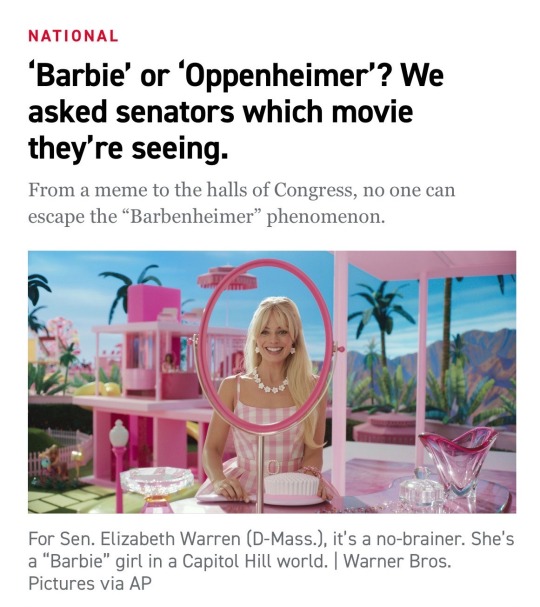
STAY AWAY FROM HER!!! 💖 💅 ✨ 🖤 💣 💥
#the barbie movie#barbie meme#barbie movie#barbie#oppenheimer#oppenbarbie#barbenheimer#ryan gosling#margot robbie#greta gerwig#cillian murphy#christopher nolan#current events#politics#politico#us politics#will ferrell#michael cera
135 notes
·
View notes
Text

This is an excerpt from a Politico article. (Politico is a journal focused on US politics, especially Washington DC politics.) Keep making yourself heard! We can force a change!
Text of the excerpt under the cut for screen readers:
One House Democrat told me of a dinner last month with about eight other colleagues, a cross-section of the caucus ideologically and generationally. "It was unanimous that this Israel-Gaza war needs to end now and that Biden needs to stand up to Bibi," this lawmaker told me, before offering his own view.
"This is a disaster politically," said this House Democrat, who rarely criticizes Israel. "The base is really pissed--and it's not just the leftists. I have never seen such a depth of anguish as I've seen over this Gaza issue. Bibi is toxic among many Democratic voters and Biden must distance himself from him--yesterday."
#politics#united states#us politics#politico#Gaza#free palestine#one of the difficulties in America is that it's not like there's a pro-zionist party and an anti-zionist party#BOTH parties are pro-zionist#if you watch past presidential debates there's usually a question about how the candidates feel about Israel#and then the candidates all gush over how Israel is their favorite#honestly embarrassing#but anyway#even though this presents a challenge for stopping the US's support of a genocide#it is not an insurmountable challenge#politicians are beginning to see this issue is not going away#so keep the pressure on#do NOT give up#for the sake of the Gazan people we CANNOT give up#so many are dead but so many are still alive
32 notes
·
View notes
Text
#september 2023#2023#articles#politico#Zachary Warmbrodt#strikes#auto workers strike#economics#pay gap
38 notes
·
View notes
Text
Blocking US weapons to Israel "on the table".

Now, this is a statement from a Senator, not the White House, and Biden has recently made clear that a total ban on arms shipments is not on the table (he specified maintaining the Iron Dome, which is a defensive system).
But this does underscore that America's support for Israel is NOT a blank check for Benjamin Netanyahu to do whatever he wants.
18 notes
·
View notes
Text
A arte de vestir

Esta imagem é verdadeiramente mágica.
Ela atesta, para quem ainda alimenta dúvidas, que vestir-se é, sem dúvida, uma arte.
Reparem, antes de mais, na harmonia das cores. Cada elemento, analisado isoladamente, pode parecer opaco: cinza, bege, azul claro e escuro... Os menos entendidos teriam optado por tons mais claros, pelo menos para a gravata. Contudo, não há tristeza na justaposição e sobreposição destas cores.
Vamos agora aos tecidos: a flanela do fato é excecional – suave e felpuda. Estamos a anos-luz dos miseráveis tecidos frios da moda atual. A gravata, certamente de caxemira, adiciona um toque de requinte. O tweed do casaco é robusto e suave. Os belos botões de chifre harmonizam com a carapaça de tartaruga dos óculos.
Continuemos com as formas: a gola da camisa está no sítio certo – nem muito justa, nem demasiado larga, nem muito alta, nem muito baixa. A sua abertura italiana mantém-se razoável, e as pontas, que o casaco esconde, têm, certamente, o comprimento necessário para equilibrar a altura do nó. Alguns poderiam argumentar que um nó maior preencheria melhor o espaço na gola. A gravata está amarrada de forma simples – quero dizer, com um nó simples; o material é suficiente para criar o volume. O que se revela na parte traseira do traje denota uma largura excecional. E que elegância! Enalteçamos a sombra que nos oferece este vislumbre!
As padrões merecem agora a nossa atenção. São discretos e variados. Listras finas na camisa e na gravata. Listras sobrepostas, mas com um espaçamento diferente. O padrão espinha de peixe no casaco é simplesmente perfeito.
Reparemos, por último, no movimento conferido pela gola levantada, pela gravata ligeiramente torcida e franzida, pelo casaco aberto... E que equilíbrio entre o elegante e o informal: a gravata é escura, mas em lã; o fato trespassado é cinza, mas é utilizado sob um casaco raglan de tweed.
Sem ostentação, sem a preocupação de se destacar.
Mas quem é este verdadeiro artista?
É Bruce Boyer, a quem devemos algumas obras notáveis sobre moda masculina: "Eminently Suitable", "Elegance - A Guide to Quality in Menswear".
Uma referência inigualável.
#Alfaiate#Ancião#arte#bem vestir#cavalheiro#dandy#Elegância#fato#gentleman#guarda-fato#guarda-roupa#Masculino#Moda#paciência#Perfecto Caballero#politico#sapatos
22 notes
·
View notes
Text
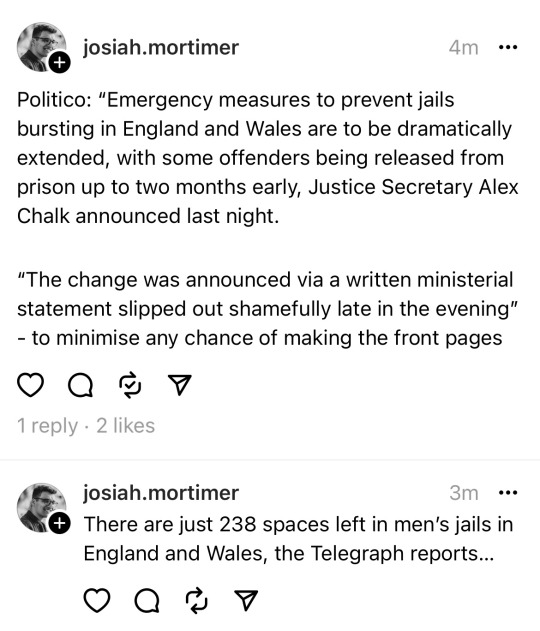
14 notes
·
View notes
Text
There was 'some concern' inside the Biden admin. that an 'unintended consequence' of the humanitarian pause is that it would 'allow journalists broader access to Gaza' which could 'further illuminate the devastation there and turn public opinion on Israel', Politico reports.

36 notes
·
View notes
Text
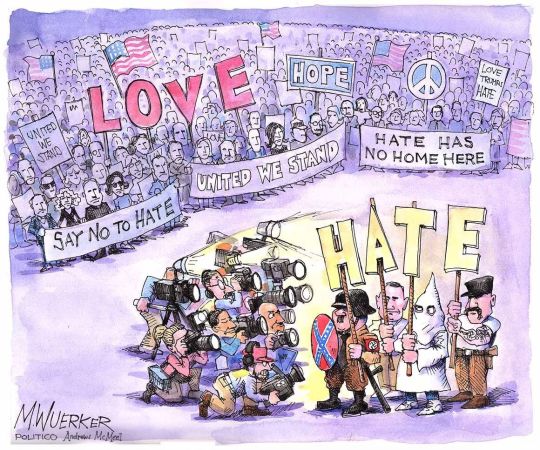
Matt Wuerker, Politico
* * * *
"Life is political, not because the world cares about how you feel, but because the world reacts to what you do. The minor choices we make are a kind of vote, making it more or less likely that free and fair elections will be held in the future. In the politics of the everyday, our words and gestures, or their absence, count very much."
Timothy Snyder, On Tyranny: Twenty Lessons from the Twentieth Century
20 notes
·
View notes
Text

#Republicans#democrats#kentucky#politico#mitch mcconnel#republicans#donald trump#poc#woc#books#news#united states#food
935 notes
·
View notes
Text
Revs. Jan Barnes and Krista Taves have logged hundreds of hours standing outside abortion clinics across Missouri and Illinois, going back to the mid-1980s. But unlike other clergy members around the country, they never pleaded with patients to turn back.
The sight of the two women in clerical collars holding up messages of love and support for people terminating a pregnancy “so infuriated the anti-abortion protesters that they would heap abuse on us and it drew the abuse away from the women,” recalled Taves, a minister at Eliot Unitarian Chapel in Kirkwood, Missouri, as she sat on a couch at Barnes’ stately church in this quiet suburb of St. Louis.
“I thought: ‘Whoa, these people really are not messing around.’ But then I thought, ‘Well, I’m not messing around either.’”
So when Missouri’s abortion ban took effect after the Supreme Court overturned Roe v. Wade last year, Barnes and Taves decided to fight back. Along with rabbis and ministers across several denominations, they joined a first-of-its-kind lawsuit arguing Missouri blurred the line between church and state, imposed a particular Christian idea of when life begins over the beliefs of other denominations, and threatened their ability to practice their religions.
As the nation nears the one year anniversary of the fall of Roe, the Missouri case is one of nearly a dozen challenges to abortion restrictions filed by clergy members and practitioners of everything from Judaism to Satanism that are now making their way through state and federal courts — a strategy that aims to restore access to the procedure and chip away at the assumption that all religious people oppose abortion.
In fact, many of the lawsuits are wielding religious protection laws enacted by anti-abortion state officials to target those officials’ own restrictions on the procedure.
In Indiana, a group of Jewish, Muslim and other religious plaintiffs sued over the state’s near-total abortion ban. Their argument: that it violates the Religious Freedom Restoration Act signed into law in 2015 by then-Gov. Mike Pence. A lower court judge sided with them in December and blocked the state’s ban from taking effect — the most significant win the religious challengers have notched so far.
Then, earlier this month, the Indiana judge granted the challengers class action status, meaning a win for them could apply to anyone in the state whose religion supports abortion access in cases prohibited by state law.
“Even if the Religious Freedom law was intended by Mike Pence to discriminate against people, we thought: ‘Let’s use this for good instead,’” said Amalia Shifriss, a leader of Hoosier Jews for Choice, one of the Indiana plaintiffs. “It brings me joy to think how much this must upset him.”
A Pence spokesperson characterized the lawsuit as a “pursuit to legalize abortion up to and even after birth.” They added: “It will probably strike Americans as pretty tasteless to call the latest iteration of their abortion crusade as a cause ‘for good’ and a source of ‘joy.’”
Conservatives with a history of mounting their own religious challenges to state laws dismiss the effort as doomed to fail, arguing that even if people can prove the abortion bans violate their beliefs, it won’t be enough to halt enforcement.
“As Justice Ruth Bader Ginsburg explained in one Free Exercise case, the right to swing your arm ends just where the other man’s nose begins,” said Denise Harle, senior counsel with Alliance Defending Freedom, a conservative legal group that has filed briefs defending state abortion restrictions, including from faith-based challenges in Wyoming and Florida. “Even if you have religious freedom, there is a line at which you are doing actual deadly harm and destroying human life, so it’s appropriate to limit what can be done in the name of religion.”
But with oral arguments and rulings in several of the cases expected this summer and fall, other legal experts say there’s a solid chance the challengers can persuade courts to grant religious exemptions to abortion bans if not strike them down altogether.
Shlomo C. Pill, a lecturer at the Emory University School of Law who specializes in religious rights, said the lawsuits have “a strong basis and should be successful,” particularly after a series of COVID-19-related cases paved the way for more religious exemptions. Pill pointed to multiple Supreme Court decisions during the pandemic that said whenever states create secular exemptions to laws — like indoor gathering restrictions or vaccine mandates — they have to justify not offering religious exemptions as well.
“So the fact that secularly-motivated exemptions to abortion bans exist — such as for rape and incest — means the legislature could also have to offer similar exemptions for people with religious objections,” he said.
‘REAL CHUTZPA’
Most of the cases, including those in Indiana, Kentucky, and Texas, are demanding exemptions from the bans for people whose religions support abortion rights. But a few, including the lawsuits in Florida, Missouri and Wyoming, are attempting to have the bans struck down entirely.
In Missouri, the plaintiffs argue that because lawmakers put religious language in the text of the abortion ban itself and made explicit religious appeals when voting on it, they violated the Establishment Clause.
“It took real chutzpah for the legislators to voice their own religious motivations, to wantonly and shamelessly purport to know what God wants or doesn’t want and to enshrine that into law,” said Rabbi James Bennett of Congregation Shaare Emeth in St. Louis, another plaintiff in the Missouri lawsuit. “They’re entitled to their interpretation of when life begins, but they’re not entitled to have the exclusive one.”
Last week, the group faced off in a St. Louis courtroom with state officials who are pushing to have the case thrown out. A ruling could come as soon as this summer.
In Florida, clergy representing Reform Judaism, Buddhism, the Episcopal Church, the United Church of Christ and the Unitarian Universalist Church sued in state court both to overturn the state’s 15-week abortion ban, and — if that fails — to secure religious exemptions. Their case makes free speech arguments as well — claiming that state bans on “aiding and abetting” abortions are muzzling clergy members who want to offer counseling to parishioners grappling with whether to terminate a pregnancy.
In Kentucky, three Jewish women are arguing that the state’s near-total abortion ban violates their belief that life only begins when a baby takes its first breath, saying it’s preventing them from pursuing pregnancy through in-vitro fertilization.
“To have someone else’s religious belief that an embryo is a human being imposed on me in a way that’s so personal, that prevents me from growing my family, is just rude and un-American,” Lisa Berlow, the lead plaintiff in that case, said in an interview. Berlow had one child through IVF and was planning to have another before Dobbs made her and her fellow plaintiffs fear prosecution. “Discarding non-viable embryos could now be criminalized, or I could miscarry and not know what type of medical care I would get or whether I would be investigated for causing the miscarriage,” she said.
The Satanic Temple is in federal court challenging abortion bans in Texas, Idaho and Indiana, arguing that the laws infringe upon their congregants’ belief in bodily autonomy and right to practice abortion as a religious ritual. A Texas District Court ruled against the Satanists last fall, saying they didn’t prove the need for a temporary restraining order blocking enforcement of the ban against its members. The 5th U.S. Circuit Court of Appeals is poised to rule on the challenge in the coming weeks.
These cases are unlikely to restore abortion rights at the federal level given the weaker religious rights protections in the U.S. Constitution compared to many state constitutions as well as the federal judiciary’s rightward tilt.
Elizabeth Reiner Platt, director of the Law, Rights, and Religion Project at Columbia Law School, stressed that the Supreme Court has a record of protecting the religious rights of some groups and not others, pointing to its back-to-back decisions in 2017 upholding the right of a Christian baker to refuse to bake a cake for a same-sex wedding and allowing the right of the Trump administration to deny entry to travelers from majority-Muslim countries.
“While I don’t like to read the tea leaves, I don’t have any hope that the current Supreme Court would, after ruling that there was no due process right or privacy right to abortion, would find a right under the Free Exercise Clause or the Establishment Clause,” Platt said.
Still, she and other legal experts see the state-level religious challenges as one of the best chances abortion-rights advocates have to chip away at bans on the procedure.
“The arguments are quite powerful for creating religious exemptions in the reproductive context under First Amendment doctrine and under state laws for Free Exercise,” said Micah Schwartzman, director of the Karsh Center for Law and Democracy at the University of Virginia Law School. “What Judges do with them is another story.”
In order to succeed, these lawsuits must prove: that the right to an abortion is central to the religious practices of the people suing; that they are sincere in their beliefs and have a track record of observing them; and that state abortion bans make it impossible for them to live according to their faith.
The cases challenging abortion restrictions in their entirety face an additional hurdle: proving that state officials stepped over the line separating church and state in crafting the bans.
“We have a really strong Establishment Clause argument because it’s clear that these bills were passed for religious reasons,” said Marci Hamilton, a professor of constitutional law at the University of Pennsylvania who is part of the legal team representing clergy in Florida. “The 15-week bill was signed in a church and members of the state legislature repeatedly referred to God when arguing why this had to be done.”
Other experts are skeptical, however, of the strength of these arguments.
“There are a million-and-one other explanations a state could give for their abortion restrictions,” Pill said. “They could argue it’s a matter of secular conscience, for example. And once you have any kind of secular justification, an Establishment Clause argument becomes more difficult.”
For their part, the states defending their abortion laws and the conservative legal groups supporting them have to prove that they have a compelling interest — unrelated to religion — in protecting fetal life, that they’re using the least restrictive means to protect that interest, and that the challengers’ claims are speculative and premature because none of them have actually sought an abortion or been blocked from obtaining one since the laws took effect.
“I think these are much more like political stunts than they are viable court cases,” said Lori Windham, a vice president and senior counsel at the Becket Fund, the legal firm behind the Hobby Lobby case that secured a Supreme Court ruling allowing many employers to opt out of covering certain forms of birth control for their workers due to a religious objection. “You can have a sincere political belief or policy preference, and it can be passionate and deeply held, but that doesn’t make it a religious practice.”
CITING SCRIPTURE
Judges have historically avoided questioning the sincerity of someone’s religious beliefs, but Becket and other groups have filed amicus briefs that do so.
To combat these accusations, the challengers point to scripture that lays out a case for abortion rights as well as support from religious leaders for their claims.
The Jewish challengers in Kentucky cite religious texts including the Mishnah that say life begins when a baby takes its first breath, not when it is conceived, and if medical issues arise during pregnancy, the pregnant person’s life “comes before the life of [the child].” They also submitted to the court letters from rabbis arguing that current state exemptions for life-threatening medical emergencies aren’t enough, saying Jewish law permits, and in some cases requires, an abortion when there is “a risk of poverty, abuse, addiction, or mental illness.”
The case challenging Missouri’s ban cites the United Church of Christ’s vote in 1971 to acknowledge the right to abortion and members’ “autonomy to determine what happens to their own bodies,” as well as the Episcopal Church’s “long-standing opposition” to any government attempt to infringe on reproductive choices.
“There’s a tendency to see these cases as kind of a clever, legal switcheroo. Like, here’s a way to take these laws that are often thought of as very conservative and use them to protect abortion rights,” Platt said. “But the idea of reproductive rights as a religious liberty issue is absolutely not something that came from lawyers. It’s how faith communities themselves have been talking about their approach to reproductive rights for literally decades.”
#us politics#news#politico#2023#abortions#abortion bans#reproductive rights#reproductive health#Missouri#Indiana#Religious Freedom Restoration Act#mike pence#Hoosier Jews for Choice#Alliance Defending Freedom#free exercise clause#religious exemptions#Kentucky#Texas#Florida#Wyoming#Establishment Clause#us constitution#in-vitro fertilization#Judaism#Episcopal Church#United Church of Christ#Unitarian Universalist Church#organized religion#religious freedom#the satanic temple
100 notes
·
View notes
Text
youtube
New bombshell report on payments to Ginni Thomas by ‘face of dark money’ Leonard Leo
MSNBC
Sept. 11, 2023
A new Politico investigation is adding to the list of scandals involving Supreme Court Justice Clarence Thomas. Heidi Przybyla reports that his wife Ginni Thomas' web of ties to conservative judicial activist Leonard Leo is far deeper and more financially entangled than previously known.
See Heidi Przybyla's reporting at Politico: What Ginni Thomas and Leonard Leo wrought: How a justice’s wife and a key activist started a movement
#ginni thomas#leonard leo#citizens united#clarence thomas#judicial ethics#dark money#heidi przybyla#politico#medhi hasan#msnbc#u.s. supreme court#Youtube
37 notes
·
View notes
Text

The Hidden History of Trump’s First Trip to Moscow
In 1987, a young real estate developer traveled to the Soviet Union. The KGB almost certainly made the trip happen.//The Hidden History of Trump’s First Trip to Moscow - POLITICO Magazine
13 notes
·
View notes
